Aviation
Boeing Hands Over First 747-8 Intercontinental to Korean Air.

EVERETT, Wash., Aug. 25, 2015 Boeing [NYSE: BA] and Korean Air today marked the delivery of the airline’s first 747-8 Intercontinental. The new fuel-efficient jet is the first of 10 747-8 passenger airplanes the carrier has on order.
“This new aircraft delivers better fuel economy,” said Walter Cho, Executive Vice President and Chief Marketing Officer, Korean Air. “That is important to a global airline such as ours. And it supports our goal to build and operate a first-class fleet of world-class aircraft.”
With this delivery, Korean Air becomes the first airline in the world to operate both the passenger and freighter versions of the 747-8. Korean Air currently operates seven 747-8 Freighters.
“Korean Air has been a valued Boeing customer for more than 40 years and we are honored to celebrate yet another milestone delivery together with their first 747-8 Intercontinental,” said Ray Conner, president and CEO of Boeing Commercial Airplanes. “As one of the few airlines that have operated almost all models of the 747 family, we are excited that Korean Air is extending the tradition with our newest 747-8 Intercontinental. I am confident that the 747-8 will continue to play an important role in Korean Air’s long-term success.”
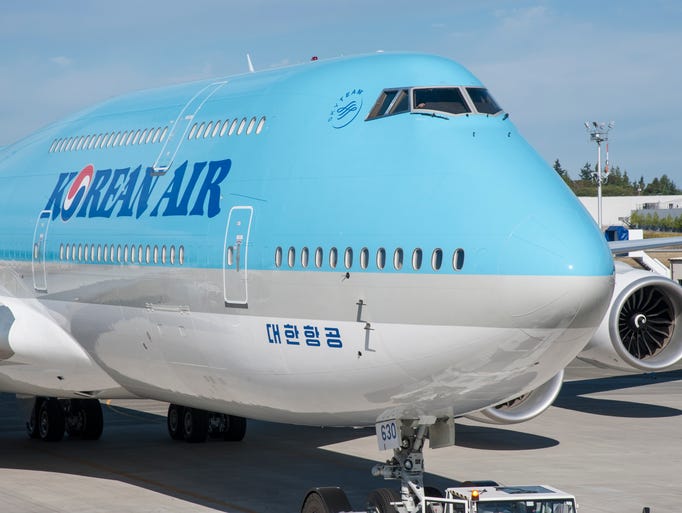

Korean Air’s first 747-8i is seen ahead of a Aug. 25, 2015, delivery ceremony in Everett, Wash
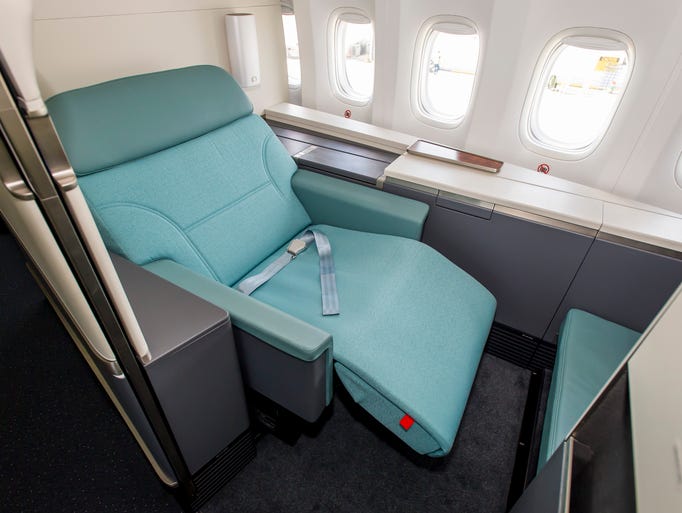
The upgraded “Kosmo Suite” first-class seats on Korean Air’s first Boeing 747-8i
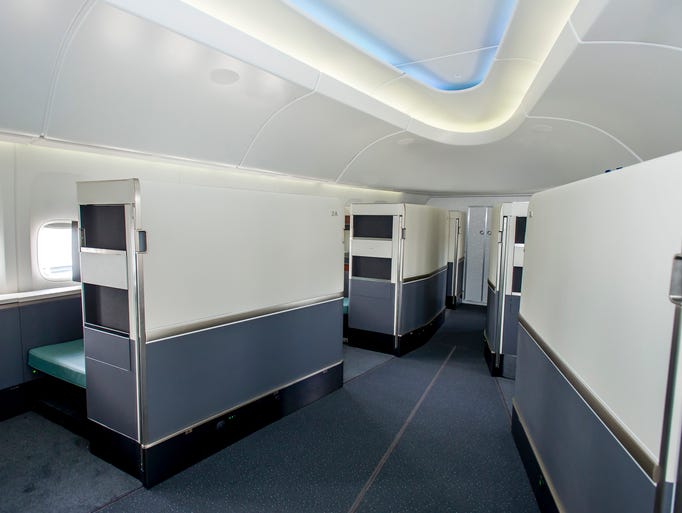
The upgraded “Kosmo Suite” first-class seats on Korean Air’s first Boeing 747-8i
Korea’s flag carrier currently operates a fleet of 87 Boeing passenger airplanes that includes 737, 747 and 777s. The airline also operates an all-Boeing cargo fleet of 28 747-400, 747-8 and 777 Freighters.
With a range of 7,730 nautical miles (14,310 km), the 747-8 Intercontinental offers 16 percent savings in fuel consumption and emissions over its predecessor, the 747-400, while generating 30 percent less noise. The airplane also features an all-new, 787 Dreamliner-inspired interior that includes a new curved, upswept architecture giving passengers a greater feeling of space and comfort.
Korean Air’s jet is configured with 368 seats and features the brand new First Class Kosmo Suite 2.0, which include a sliding door and higher partitions to provide added privacy for passengers. The suites are also equipped with updated in-flight entertainment systems, with large 24-inch high-definition monitors and new handheld touch remotes.
The airline’s Business Class Prestige Suites will feature staggered seating and privacy panels, along with 18-inch high definition touch screens.
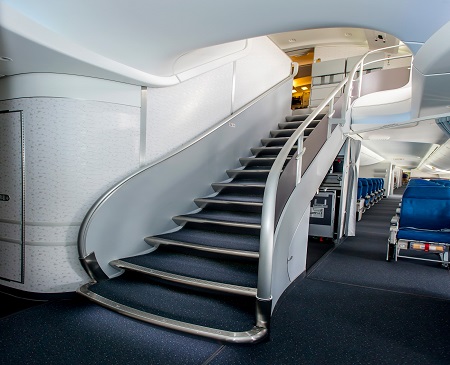
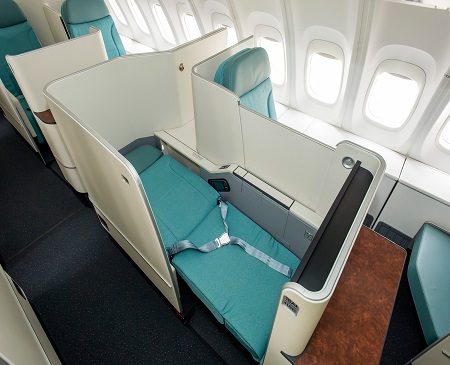
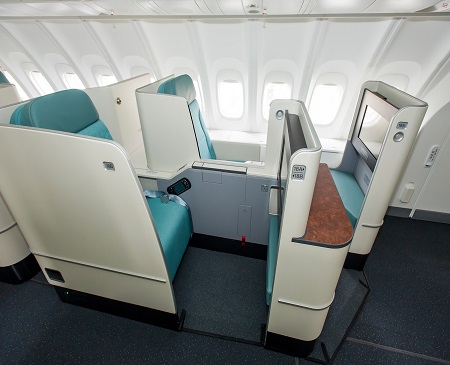
Korean Air’s Aerospace Division is a key Boeing partner on both the 747-8 and 787 programs, supplying the distinctive raked wing-tips for each model. They are also one of two suppliers producing the new 737 MAX Advanced Technology (AT) Winglet.
Korean Air, with a fleet of 161 aircraft, is one of the world’s top 20 airlines, and operates more than 430 flights per day to 128 cities in 45 countries. It is a founding member of the SkyTeam alliance, which together with its 20 members, offers its 612 million annual passengers a worldwide system of more than 16,000 daily flights covering 1,052 destinations in 177 countries.
liked it ..! ?
Share with your friends and families

Aviation
Airbus is set to increase the production rate for the A350 as demand surges

Airbus SE is set to boost production of its advanced A350 widebody jet as it capitalizes on rising demand for long-distance travel and wide-body aircraft, amidst the ongoing crisis affecting its competitor Boeing due to issues with the B737 Max.
The surge in orders for Airbus’s A350 aircraft has instilled confidence in the company, prompting them to ramp up production rates. This move is particularly advantageous as Boeing continues to grapple with production quality issues surrounding its 787 and 777x aircraft.
In 2024 alone, Airbus has received 137 orders for the A350, signaling a need to expand manufacturing capabilities to meet customer demands. With 1,277 orders received and 592 aircraft delivered as of April 2024, Airbus is poised to fulfill pending deliveries efficiently.
The European aircraft manufacturer announced plans to increase production of A350 jets to 12 per month by 2028, surpassing earlier projections aiming for 10 per month by 2026. This decision was disclosed alongside the company’s first-quarter figures.
The Asian market is proving lucrative for the A350, with significant orders from airlines like Indigo and Air India, totaling nearly 70 aircraft commitments for the future. Meanwhile, Airbus is progressing with its A220 and A320 programs, aiming for a monthly production rate of 14 and 75 aircraft, respectively, by 2026. Additionally, the long-range A321XLR is anticipated to commence service in the third quarter of the current year.
In contrast, Boeing has been compelled to scale back production due to regulatory pressures aimed at enhancing factory processes. While Airbus anticipates a positive market outlook, Boeing continues to face challenges with FAA certification and quality approvals, resulting in ongoing delays for its 737 Max and 777x models.
Financially, Boeing reported a significant cash burn of $3.9 billion in the first quarter, leaving it with $7.5 billion in cash and short-term securities by the quarter’s end, down from $16 billion at the beginning of the year. Consequently, Boeing’s stock has plummeted by 38% in the year so far, contrasting with Airbus’s 14% gain, marking Boeing’s lowest performance in over a year.
For a full listing including details on customers and regions, as well as historical data for the previous year, go to the download section below.
- March 2024 deliveries: 63 deliveries to 32 customers
- March 2024 gross orders: 137
- 2024 deliveries to date: 142 deliveries to 45 customers
| Single-Aisle | A300/A310 | A330 | A340 | A350 | A380 | TOTAL | |
|---|---|---|---|---|---|---|---|
| Total Orders | 19470 | 816 | 1774 | 377 | 1277 | 251 | 23965 |
| Total Deliveries | 11705 | 816 | 1598 | 377 | 592 | 251 | 15339 |
| Aircraft in Operation | 11007 | 271 | 1482 | 202 | 591 | 234 | 13787 |
Aviation
All passengers killed in plane crash, after pilot let his children to control the plane

When boarding a plane, passengers entrust their safety to the skilled hands of the pilot. However, tragedy struck when one of the flight ended in disaster as all passengers lost their lives in a horrific plane crash.
In 1994, during a flight from Moscow to Hong Kong, tragedy struck as an Aeroflot relief pilot made a fateful decision. In a move that would have devastating consequences, the pilot invited his own children into the cockpit to play with the controls. Little did anyone know, this seemingly innocent gesture would lead to the loss of all 75 lives aboard the aircraft.
It was a seemingly innocent act that led to catastrophic results. The relief pilot, Mr. Kudrinsky, invited his two children, Yana, 12, and Eldar, 15, into the cockpit during the late hours of the night. Little did anyone know, this simple gesture would set off a chain of events that would end in tragedy.
Once in the cockpit, the children were allowed to sit in the captain’s chair and play with the controls, unaware that they should have been disabled as the plane was in autopilot mode.
Eldar, perhaps in a moment of curiosity or innocence, held the control column down for a mere 30 seconds. Yet, in those brief moments, the autopilot disengaged, thrusting the aircraft into manual control.
By the time the pilots regained their seats and attempted to regain control, it was too late. Despite their efforts to pull the plane out of a dive, they overcorrected, causing the flight to climb almost vertically, ultimately stalling it.
Final moment Flight 593 crash
In the final moments, as the pilots struggled to stabilize the aircraft, Flight 593 crashed into the Kuznetsk Alatau Mountain range in southern Russia, completely obliterating the plane and claiming the lives of everyone on board.
Investigations revealed a chilling truth: there was no evidence of technical failure. Instead, the crash was attributed to the unthinkable decision to allow inexperienced hands to manipulate the controls of a commercial aircraft.
The black box recording captured the harrowing sequence of events, providing a grim reminder of the human cost of a lapse in judgment. In just over two minutes, the lives of all on board were tragically short, leaving behind a legacy of sorrow and unanswered questions.
Aviation
American Airlines Flight Attendant Orders First-Class Traveler to use Economy Restroom

On a recent American Airlines flight from Chicago O’Hare to Phoenix, Pamela Hill-Veal, a retired circuit court judge, found herself at the center of a disturbing incident.
Despite traveling in First Class, she was directed by a flight attendant to use the Economy Class restroom, sparking allegations of racial discrimination. According to Hill-Veal, the ordeal began when she used the dedicated First Class lavatory during the flight. A flight attendant approached her, accusing her of slamming the door and issued a warning.
Despite remaining calm, Hill-Veal faced further confrontation when she attempted to use the First Class restroom again later in the flight. The situation escalated as the flight attendant persisted in berating Hill-Veal, who felt targeted due to her race. She highlighted the disparate treatment, noting that white passengers were not subjected to similar directives.
In a distressing turn, the flight attendant followed Hill-Veal to her seat and allegedly touched her while threatening arrest upon landing. This alarming encounter left Hill-Veal feeling humiliated and traumatized, impacting her ability to rest even after the flight.
American Airlines has responded, expressing a commitment to investigating the matter and addressing discrimination claims seriously. However, the incident underscores ongoing concerns about racial bias in air travel and the need for accountability in ensuring all passengers are treated with dignity and respect.



























